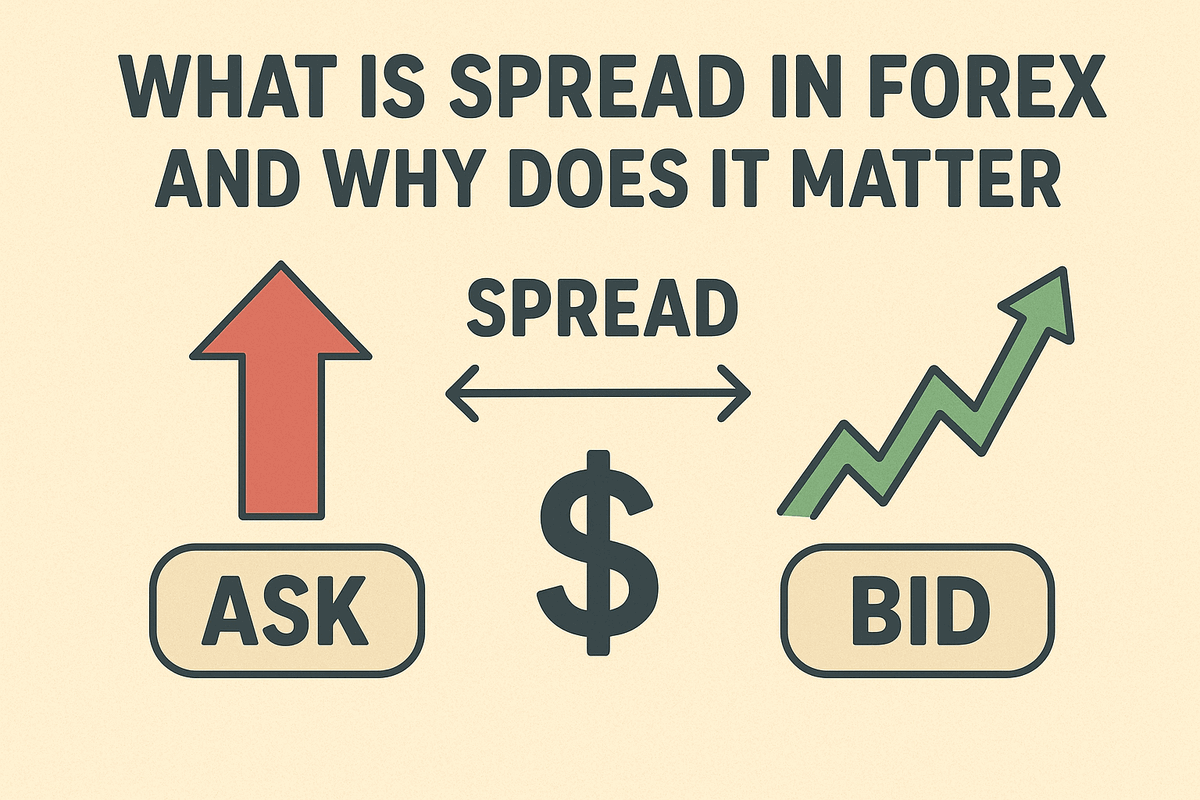If you’ve ever placed a trade in forex, you’ve already paid the spread — whether you knew it or not. Many beginners ignore spreads, but they are one of the most important costs in forex trading.
In this guide, I’ll explain what spread in forex means, why it matters, the different types of spreads, and how it affects your trading results. I’ll also share a quick personal story about how ignoring spreads almost wiped out my small account
Key Takeaways
- Spread in forex is the difference between the bid price (sell) and ask price (buy).
- It represents the broker’s commission or cost of executing your trade.
- Tight spreads are better for scalpers and day traders.
- Wider spreads usually happen in volatile markets or low-liquidity pairs.
- Choosing the right broker and trading time can reduce spread costs.
What is Spread in Forex?
The spread in forex is the difference between the buying price (ask) and the selling price (bid) of a currency pair.
Example: If EUR/USD has a bid price of 1.2000 and an ask price of 1.2002, the spread is 2 pips.
This cost goes directly to your broker. It’s like a small toll fee you pay every time you enter a trade.
Why Does Spread Matter in Forex Trading?
Spreads affect your trading profitability because they decide how much you start in negative territory when you open a trade.
- If the spread on EUR/USD is 2 pips and you open a buy position, your trade starts with a -2 pip loss.
- The market must move at least 2 pips in your favor just to break even.
For scalpers and intraday traders who target small profits, spreads can eat a big part of their gains. That’s why choosing a broker with low spreads is crucial.
| Type of Spread | How It Works | Best For | Drawbacks |
|---|---|---|---|
| Fixed Spread | Spread remains constant regardless of market volatility | Beginners, low capital traders | May widen during extreme volatility, higher on average |
| Variable (Floating) Spread | Spread changes depending on market conditions | Experienced traders, scalpers | Can widen suddenly in volatile markets |
Factors That Affect Forex Spreads
Several things influence how wide or tight a spread is:
- Currency Pair – Majors like EUR/USD have tighter spreads, while exotic pairs like USD/NGN have wider spreads.
- Market Volatility – During news events or economic reports, spreads can widen sharply.
- Broker Type – ECN/STP brokers usually offer lower spreads than market makers.
- Trading Session – Spreads are tighter during London and New York sessions and wider in Asian session.
How to Minimize the Cost of Spreads
- Trade major pairs (EUR/USD, GBP/USD, USD/JPY) with naturally lower spreads.
- Trade during high liquidity hours (London & New York overlap).
- Use ECN brokers if possible, as they provide raw spreads plus a small commission.
- Avoid trading during major news releases, unless you are experienced.
- Keep an eye on your broker’s spread conditions (some widen spreads at night).
FAQ on Forex Spreads
Q1: What is the average spread in forex?
On major pairs like EUR/USD, the spread is usually 1–2 pips. On exotic pairs, it can go above 20 pips.
Q2: Which forex pairs have the lowest spreads?
EUR/USD, GBP/USD, USD/JPY, and AUD/USD usually have the lowest spreads because they are highly liquid.
Q3: Is spread the only cost of trading forex?
No. Some brokers charge commissions on top of spreads, while others use spreads as their only fee.
Q4: Why do spreads widen during news events?
Because liquidity providers adjust pricing when the market becomes highly unpredictable, protecting themselves from risk.
Q5: Should beginners trade with fixed or variable spreads?
Beginners often prefer fixed spreads because they are predictable, but variable spreads are usually cheaper in normal conditions.
Final Thoughts
So, what is spread in forex and why does it matter? It’s the cost of doing business in forex trading. Spreads may look small, but over time, they add up and can make the difference between profit and loss. If you want to grow in forex, pay attention to spreads, choose the right pairs, trade at the right times, and always factor in costs before entering a position.
Remember: trading is not just about catching moves, it’s also about managing costs — and spreads are one of the biggest hidden costs in forex.
